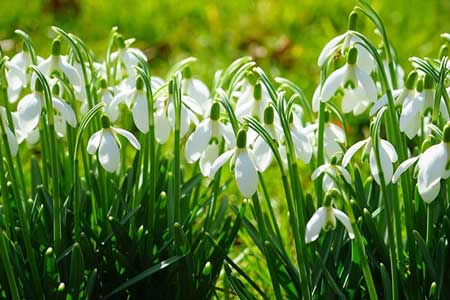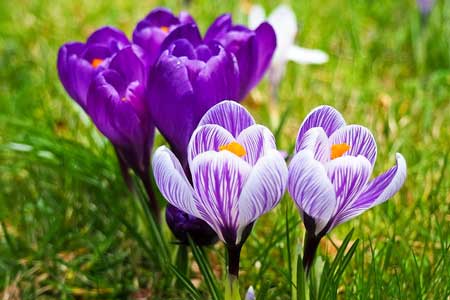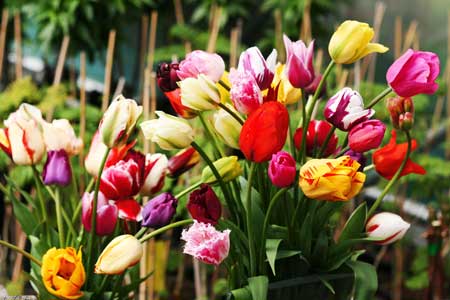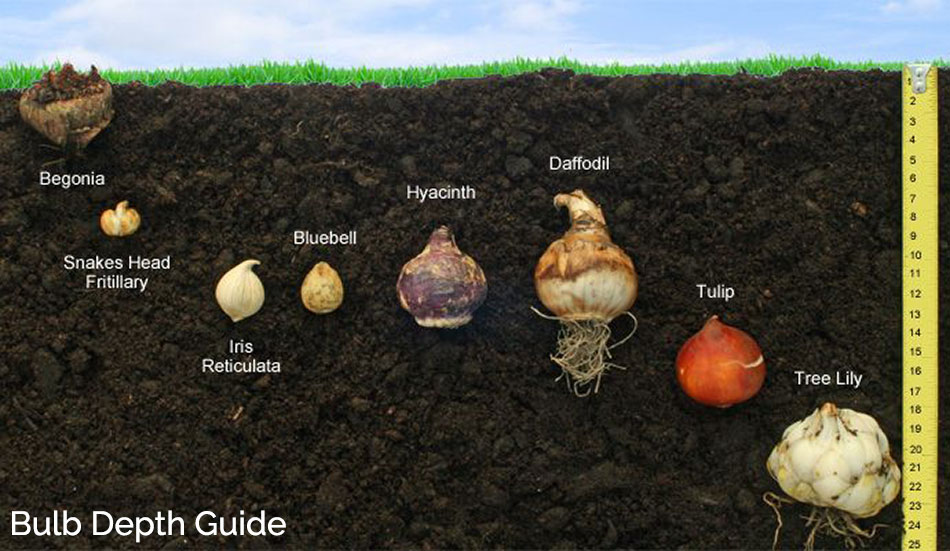March Gardening
Plant bulbs now for early Spring blooms
Autumn is the best time for planting out bulbs for a delightful Spring blooming show. While planting bulbs in April and May is great for successive blooming, getting stuck-in with your early bloomers in March means flowers are ready to show themselves right at the beginning of Spring - just when we all need a lift from the dreariness of winter.
Bulbs are such a good investment because they multiply underground every year then burst out of the ground in spring to reward us with even larger clumps of colour! Just when it seems that winter will never end, up pop the snowdrops and crocuses. Happy days of Spring!
Blubs to Plant Now:

Snowdrops
Dainty white bell-shaped flowers with a green spot on the outside of each petal are well suited to being planted under deciduous trees where they can spread their pretty white skirts in the first rays of sunshine.
Freesias
Usually grown for cut flowers, these have long been popular in Kiwi gardens and their sweet perfume and array of beautiful colours make an impact wherever you plant them. Their delicate. posy-styled appearance give them a cottage feel that provide a wonderful display in border gardens or patio pots.
Daffodils
The mainstay of a spring display; daffidols are pretty and bright with bulbs that can last up to eighty years! The first to flower are the ‘Paper Whites’ and ‘Soleil d’Or’ with four to eight flowers on a stem and a lovely strong fragrance epitomsing all things Spring.
Whereas the leaves of snowdrops and crocus fade away quietly, daffodil leaves can be unsightly and lean all over the garden. Either grow smaller varieties such as ‘Tete-a-tete’ or grow your larger trumpet daffodils near the back of the garden so that taller summer plants will grow up and hide their dying leaves.

Hyacinths
Show off their giant spikes crowded with flowers in colours of white, yellow, pink, light blue, dark blue, purple and apricot. Plant some hyacinths in containers filled with bulb mix and their noses just at the surface. Water, set aside in a cool place and when the flower buds start to push out of the bulb bring the bowl to your entrance way and enjoy the perfume.
Crocuses
Also one of the earliest bulbs to flower that don’t need full sun, and will flourish in semi shaded areas. There is always room to squeeze in a few crocuses to the garden or rock garden pockets where they will tempt you outdoors after a bleak winter.
Bluebells
Their lavender-blue bell shaped flowers will give a stunning display, clump planted under trees, where they will naturalise into larger hazy blue drifts.

Tulips
Large, beautifully formed bell shaped flowers can be elegant, subtle, even wayward and unpredictable in the garden. What flower dies as elegantly as the tulip? Then there is the crazy parrot tulip ‘Rococo’ with red and pink petals feathered and flared in crinkly lime green!
During the 1630s, the tulip was so much the rage of fashion that a handful of bulbs became worth thousands of dollars. The Netherlands had a huge mania for tulips that staggering sums of money were paid for their bulbs. Some were recorded at having been sold for over 5.000 guilders, which, in today's equivalent monetary value would be about twenty years wages for a bus driver. Tulips make a beautiful addition to any garden and you will love seeing their voluminous, striking heads of colour poking out through the mix and gently swaying on the breeze.
How to plant:
- Plant bulbs at a depth equal to twice the size of the bulb and in soil that is well drained and not too rich.
- Try some Bulb Food that contains all the necessary nutrients including calcium needed for growing bulbs.
- When planting bulbs in a container, plant for a succession of flowers. Choose a good sized container and plant crocuses, early and late daffodils, and early and late tulips all together.
- If using a bulb mix, plant them at different depths such as large daffodils at a deeper level and little bulbs like crocuses nearer the surface. As bulbs are little ‘power houses’, they can live on themselves until they have finished flowering so cram them into the container and create a mass of colour that all hold hands together.
- After they have flowered empty them into the garden to multiply over the summer.
- One caution would be if living in close proximity to sheep, avoid planting where the bulb may come into direct contact with sheep manure.
Flower plants to plant now for combined spring flowering with your bulbs are forget-me-nots, bellis daisies, pansies, violas, and dwarf wallflowers.
This is also a good time to plant aquilegia, lupin, antirrhinum, wallflower, poppies, Sweet William and aubretia are also great options and will bloom during late spring when the bulb show is over.
Vegetable Garden Maintenance
Another, possibly less exciting, job that needs doing in March is maintaining the growth of your veggies.
- Hoe earth up around leeks and celery as well as cabbage, cauliflower, broccoli and brussels sprouts to stop them from being flattened by the wind.
- To stop white butterfly attacking your winter greens keep the Derris Dust handy and reapply after rain.
- If tomato plants are still madly producing greenery, and fruit is not ripening, reduce watering and this will shock the fruit into ripening.
And then there is keeping weeds under control. There is no such thing as doing a bit of gentle weeding unless you have only one window box. Weeds are such great colonisers and if it is simply broken off, it will be invisible for a while, then grow back bigger and better than ever. You have to take your hat off, even salute their capabilities because without the slightest bit of help they grow faster than our other plants and breed massive families that smother our garden plants.
Autumn is also the best time to sow a new lawn. For more information, refer to our Handy Helper - Lawn Care.
Happy Gardening Everyone

7909